PRINCETON, NJ -- At 36%, Americans give President Barack Obama his lowest job approval rating yet on his handling of the economy. By contrast, the president's 51% approval rating on handling foreign affairs is up slightly from last month.
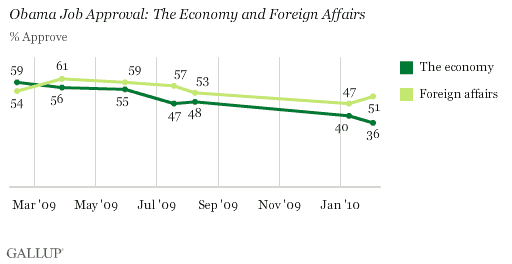
Gallup measured Americans' ratings of the president on nine issues in its Feb. 1-3 survey. Obama's rating on foreign affairs is second only to education at the top of the list; these two constitute the only issues on which Obama receives a majority approval rating. Obama's rating on his handling of the economy is second only to the federal budget deficit as the lowest of the issues measured.
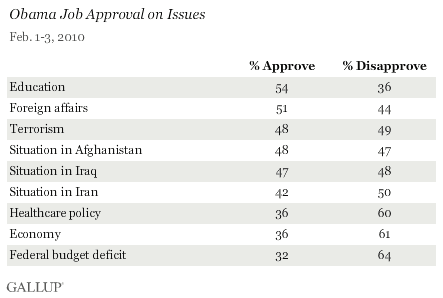
Former Alaska Gov. Sarah Palin criticized the president on his handling of terrorism this weekend at the National Tea Party Convention in Nashville, and later in a television interview she assailed Obama's "perceived lackadaisical approach that he has to dealing with the terrorists."
"[Obama's] ratings on the deficit have trailed his overall approval rating each time they have been measured."
Despite this type of criticism from Palin and other Republican leaders, Obama's approval rating on terrorism has remained roughly steady over the past several months. At 48%, it is about the same as his overall job approval rating in recent weeks, and is above the average of the nine issue ratings measured in this survey.
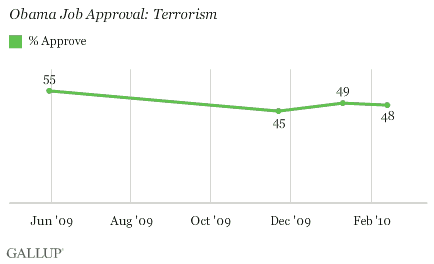
In an interview with CBS News on Feb. 7, prior to the Super Bowl, the president made a surprise call for a half-day, bipartisan, nationally televised summit on healthcare. The political need for Obama to make such a bold move is underscored by his relatively low 36% approval rating on his handling of healthcare. Obama's healthcare approval rating is statistically little different from the 37% he received last month, but the two ratings are the lowest of his administration.
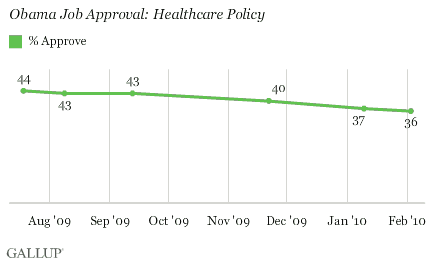
Americans give Obama his lowest rating, 32%, on handling the federal budget deficit, down from 38% when this was last measured in September. His ratings on the deficit have trailed his overall approval rating each time they have been measured. In late March, for example, Obama received 49% approval on handling the deficit while at the same time his overall approval rating was above 60%.
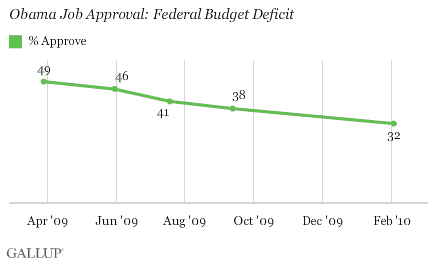
The American public gives Obama essentially identical ratings on his handling of the wars in Iraq and Afghanistan. In September, the last time that presidential job approval on the two wars was measured in the same survey, Americans rated Obama's handling of Iraq substantially higher than his handling of Afghanistan.
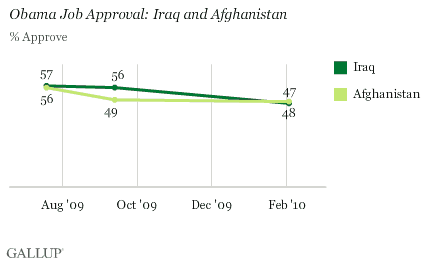
Gallup asked Americans about the president's handling of the situation in Iran for this first time in this survey. Obama has recently been involved in a decision to establish a greater presence of American guided missiles -- using Navy ships and land-based capabilities -- around Iran. At this point, 42% of Americans say they approve of the way he is handling Iran.
Obama's approval rating on education (54%) is virtually unchanged from August (53%), the only other time it has been measured.
Partisan Differences
Democrats' approval of the job Obama is doing on these nine issues is predictably high, relative to the ratings Republicans give him. Independents' ratings are generally closer to the lower ratings of Republicans than to the higher ratings of Democrats.
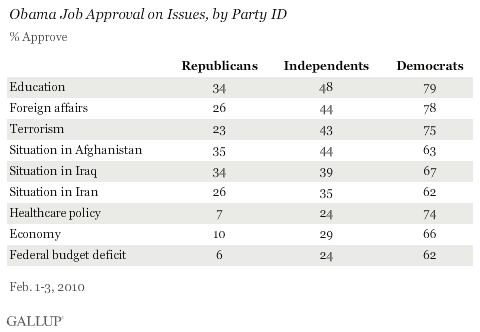
Despite Democrats' relatively positive ratings of Obama, there is variation across the issues measured. Democrats give Obama his highest approval on education (79%) and his lowest on his handling of the deficit and the situation in Iran (62% each).
Republicans give Obama his highest ratings on his handling of Afghanistan (35%), education (34%), and Iraq (34%), and lows of 6% on the deficit and 7% on healthcare policy. Republicans' approval of Obama's handling of terrorism is at 23%, making it one of the four lowest ratings they give the president.
Bottom Line
The American public's views of how President Obama is handling the various challenges he faces in the White House continue to differ significantly. Americans are most positive about Obama's handing of education and foreign affairs, and least positive about his handling of the federal budget deficit, the economy, healthcare policy, and the situation in Iran.
Obama's ratings on Afghanistan, foreign affairs, education, terrorism, and healthcare policy have remained roughly the same or have increased at least slightly compared to the last time they were measured. His ratings on his handling of Iraq, the deficit, and the economy are down from the last time they were measured.
Republicans' approval ratings are much lower than Democrats', as would be expected. Republicans give Obama particularly low ratings -- 10% or lower -- on his handling of the deficit, healthcare, and the economy.
Survey Methods
Results are based on telephone interviews with 1,025 national adults, aged 18 and older, conducted Feb 1-3, 2010. For results based on the total sample of national adults, one can say with 95% confidence that the maximum margin of sampling error is ±4 percentage points.
Interviews are conducted with respondents on land-line telephones (for respondents with a land-line telephone) and cellular phones (for respondents who are cell-phone only).
In addition to sampling error, question wording and practical difficulties in conducting surveys can introduce error or bias into the findings of public opinion polls.
